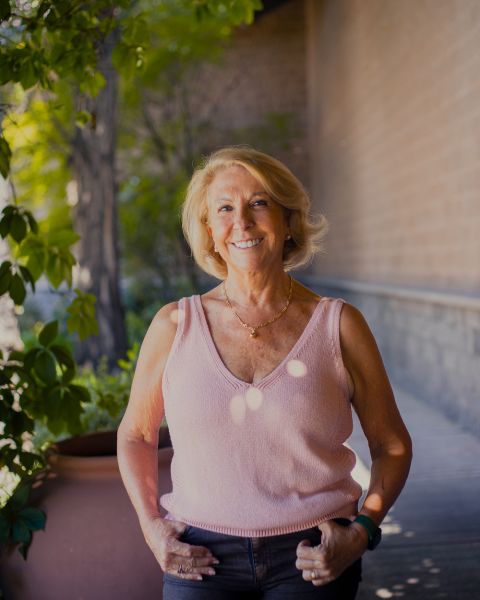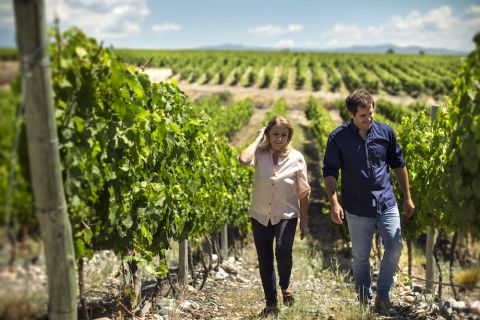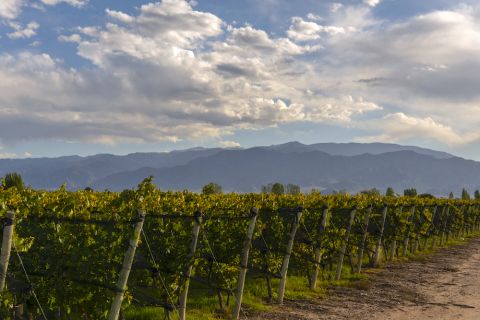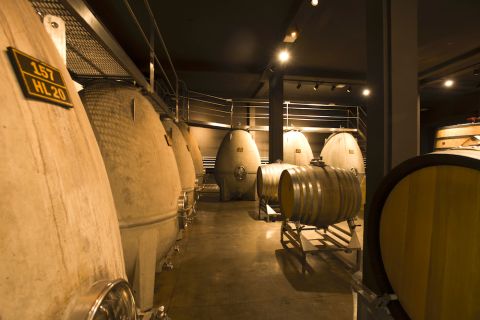From 189 Swedish kronor, 9,738 Argentine pesos, $27.99, £23.14, SG$65
On a recent Zoom chat with the irrepressibly confident and articulate Susana Balbo, I asked her, ‘How do you deal with fear?’ She paused, crinkled her nose, and her reply, a moment later, was a little unexpected.
‘We have two main engines in our life. One is love, the most important engine, the most positive energy. Even nature gives this to us. Look at a tree or a flower, you feel this energy. The second engine for daily life is fear. Fear to fail; the fear to not be able to overcome; the fear to fail in work, as a mom, in relationships. For me that was something that pushed me to do my best all the time. The only way to avoid fear is to face fear.’
‘One day I had a big problem with my eyes. My kids were very small, and we were in the swimming pool, and I realised I was unable to see them. I knew then I had to have surgery. But this was back in 1990 and eye surgery meant you went under a knife. I delayed that surgery ten times! Eventually, my therapist said to me, very frustrated by now, "Literally, what do you not want to see? Think about what you want to avoid. Do you want to avoid better vision?’" I recognised that I was afraid of the big bad thing that may not happen and was overlooking the good thing that would probably happen. My fear was making me avoid the small issue at the cost of the much bigger issue. My brother-in-law said to me, "you want to kill the mosquito with the bomb."'
Balbo holds such an iconic position in the leagues of the Argentine industry and pioneering female winemakers that it’s difficult to separate Balbo the person from the journalistic clichés that have cropped up like impenetrable thickets around her over the years: ‘trailblazing’, ‘female pioneer’, queen of Torrontés’, ‘the first woman in Argentina to receive a degree in oenology’, ‘most highly regarded’. She's been making wine for more than 40 years, spent two decades flying around the world as a consultant, and has been running her own estates for nearly a quarter of a century.
It was interesting to chat to her, albeit over Zoom, and discover a straightforward, relaxed, honest person without any airs and graces. I took the chance to ask her questions that were not really related to the wines in front of us. I wanted to ask her the questions that all of us women want to, but perhaps don’t have the courage to ask – about the grey, sometimes scary spaces in the wine industry that women (and all of us) have to navigate.
We talked about her children, fear, her employees, the colour of energy, research around the world, lunch, love, compassion, the silver cord of the universe. Her university studies and training were fruit and vegetable preservation. She studied fermentation as a chemist in the food industry, not as a winemaker. ‘I knew more about milk pasteurisation than I knew about wine yeasts’, she told me. ‘When I first started, working in dirty wineries, the one thing I understood was hygiene and pasteurisation. I knew how to clean a winery!’ (She looks fierce for a second, and then throws her head back and laughs.)
I ask her about those early years. She tips her head up, looking to some place on the ceiling, closes her eyes, and then says, with her eyes still closed for a bit: ‘I was very, very young. Everyone was looking to me and thinking “she must fail, she can’t cope, she has a low education” . Everybody bet I was going to fail and for me that was where my strength began. But’, and she pauses and pins me to my chair with her look, ‘I had a mentor who was a priest and the dean of the university. He gave me advice. First advice: “Never give up. You can.” Second advice: “One step at a time. To show talent, start slowly. The bigger the project, the more chances you have to fall!” So I start small, always.’ She throws her head back and cackles again, and then leans forward, more serious, ‘I feel gratitude: to have the possibility, to the people that were with me during all my way; people that have passed away; gratitude to give to my kids and my grandkids, to give them this. The past is a life that only gives life in the way that you already did.’
I’m not a huge fan of Torrontés, as I find it too often tastes like cheap perfume lingering in a teenager's bedroom. But Balbo wears her crown for a reason, it seems, as her 2022 Signature Torrontés won me over. It comes from Finca La Delfina, a vineyard at 1,150 m (3,770 ft) in elevation in the Paraje Altamira subregion of the Valle de Uco, Mendoza, planted in 2005 on sandy loam soils over a lot of limestone and a considerable depth (1.3 m/4.3 ft) of colluvial stones. The hand-picked grapes were destemmed, cooled and then fermented with selected yeasts in new and used French oak barrels where it spent four months after fermentation. It underwent weekly bâtonnage to give the wine body and richness.
The limestone and elevation have viscerally etched this wine. It smells of orange blossom, but this is not a flower wine. It's a liquid sculpture with structural-stone weight carved into roundness and bevelled contours. It tastes, at first, of tangerine peel. Then exotic: passion fruit (black-pip-peppery-bitter crunch juddering through the wine like a tiny shock wave). But it finishes with more subtlety, more texture: white peach flesh, pink peach skin, kumquat, bitter orange, and, towards the end, vanilla pod. It’s fragrant, juice-drenched and packed with energy.
The 2021 is also widely available still, but I prefer the 2022 which seems to have a bit more body, complexity and a little less oak. You could pair this with quirky stuff: salmon and clementine ceviche; cold chilli prawns with mango salsa; grilled nectarine, fennel and burrata salad. Add a sprinkle of Chinese five spice, or rough-chopped cilantro leaves.
It's rare that you can take Torrontés this seriously.
The wine is available from the Systembolaget in Sweden (at the cheapest price by far, surprisingly), at Shelved Wine in the UK for £23.14 and Spiritus Wines in Connecticut for $27.99. Great Wines Direct in the UK also sells it, but it's more expensive. It's also available in Singapore and of course Argentina. There are plenty more outlets in the UK and US currently selling the 2021, and they're likely to take on the 2022 vintage in the coming months, so keep an eye out.
Members can find expert reviews of dozens of Susana Balbo's wines in our database of nearly a quarter of a million tasting notes.
The main image is of Susana Balbo's Finca La Delfina in Paraje Altamira, photo by Carol Ahumada. All images are published here with permission from Susana Balbo.




















